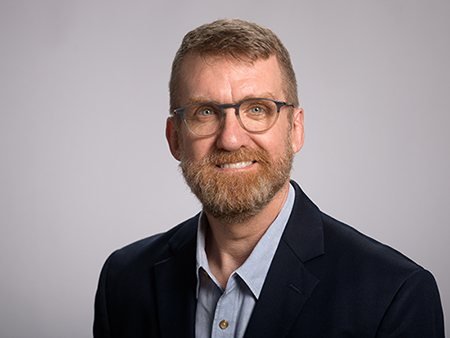Media contact: Alicia Rohan
 Lee Meadows, Ph.D.Balancing science education while navigating the various belief backgrounds within any given classroom can be difficult. Lee Meadows, Ph.D., professor at the University of Alabama at Birmingham, recently released a book, “Making Sense of Science and Religion: Strategies for the Classroom and Beyond,” to help science educators explore historical and cultural contexts and constitutional and legal frameworks for science education.
Lee Meadows, Ph.D.Balancing science education while navigating the various belief backgrounds within any given classroom can be difficult. Lee Meadows, Ph.D., professor at the University of Alabama at Birmingham, recently released a book, “Making Sense of Science and Religion: Strategies for the Classroom and Beyond,” to help science educators explore historical and cultural contexts and constitutional and legal frameworks for science education.
He aims to provide guidance for teaching specific scientific concepts at every grade level and offer advice for engaging families, administrators, policymakers and faith communities.
“Teachers need to have a big-picture view to help them understand all the issues involved in teaching controversial subjects in the science classroom,” said Meadows, a professor in the UAB Department of Curriculum and Instruction. “It’s not about ramming it down kids’ throats. It’s about approaching the issue with sensitivity to kids from faith backgrounds and understanding how we can do this while creating as little conflict as possible. In my work and in this book, we lay it out for people: You can do both.”
Co-edited with fellow science educators, written by a mix of K-12 teachers, college professors and science-education experts, and published by the National Science Teaching Association, “Making Sense” is not necessarily a how-to book, Meadows says. His 2009 book, “The Missing Link: An Inquiry Approach for Teaching All Students About Evolution,” covered those bases. Rather, it provides what he calls a contextual “grand tour” of the issues instructors face and why they face them.
Development of Meadows’ teaching philosophy
As a child, Meadows loved science. At 18, he considered a major in biology. But he was also raised Baptist, during which he learned about creationism — and to a college freshman trying to select a major, these qualities were mutually exclusive, explains Meadows.
The sticking point was the subject of evolution. Throughout his Christian upbringing, Meadows says, he was taught from a strictly six-day-creationist viewpoint — a fact that caused his high school and early college science education to be an uncomfortable experience.
“I was afraid when I got to ninth grade and knew my teacher would teach evolution,” Meadows said. “Then, when I got to college and was choosing a major, I knew biology was my love; but I steered more toward chemistry and physics instead of a biology major because I was still afraid of learning evolution — even as a college student.”
It was not until Meadows was a doctoral student studying science teacher education that he began to explore how he could learn about evolution while staying true to his faith, he says. He has spent years since that revelation working with science educators — across the state, region and nation — on curriculum options that can enable students from faith backgrounds to learn about typically contentious or politicized topics such as evolution, climate science and the origin of the universe.
Finding a balance
As a lifelong Southerner and Christian, Meadows says he knows how difficult approaching contentious topics such as evolution and climate change can be in Alabama classrooms.
“I love the South. I’m a Christian, and I love my faith,” he said. “I love the meaning it gives me for living in the world, and so many Alabamians are that way. But this is a conservative state, and we tend to do things like we’ve always done them.”
Meadows has spoken to hundreds of public-school science educators over the years and often hears the same concerns: They worry, if they teach evolution, they will be ostracized by their communities or a student will feel isolated and excluded because their faith does not align with the curriculum. Sometimes teachers will report that their school administrators warned against evolution education. A common response to those issues, Meadows says, is that instructors just do not teach topics such as evolution, or they say students must “check their religion at the door” and they teach just cold, hard science.
Meadows believes there is a middle ground and is passionate about science classrooms’ becoming an environment where students of faith can learn about science without experiencing emotional turmoil, he says. That process begins with educating instructors on how to do just that.
“Public schools are just that — public,” he explained. “Every kid should be comfortable and feel welcome. They shouldn’t be a place where kids who grow up with religious faith feel attacked — whether they’re kids from Christian, Jewish, Muslim or Native American homes. Their parents shouldn’t feel that their worldviews are being criticized. In Alabama, and in Alabama public schools, kids can learn evolution and it doesn’t have to be an assault on their faith. It doesn’t have to be that at all.”
A wide influence
In addition to his work as an educator, author and editor, Meadows is a member of the advisory committee for the Smithsonian Museum of Natural History’s Human Origins Program, where he helps recommend ways to present evidence of human evolution within the museum that remains sensitive to the American public, including the diversity of religious perspectives.
“It’s been a strange and wonderful ride,” Meadows said.
And while he notes that he is not what he calls a “six-day creationist” anymore, he remembers what it was like to grow up as someone afraid of topics such as evolution.
“In college, I didn’t take it. I was afraid of it,” he said. “Now, I’m enjoying its connections back to my faith.”